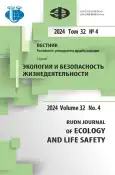Ecological monitoring of landscape technogenic neoplasms
- Авторлар: Dostovalova D.A.1, Glukhov A.Z.1, Podgorodetsky N.S.2, Zhukov S.P.1
-
Мекемелер:
- Donetsk Botanical Garden
- Donbass National Academy of Civil Engineering and Architecture
- Шығарылым: Том 32, № 4 (2024)
- Беттер: 431-444
- Бөлім: Environmental Monitoring
- URL: https://journal-vniispk.ru/2313-2310/article/view/324068
- DOI: https://doi.org/10.22363/2313-2310-2024-32-4-431-444
- EDN: https://elibrary.ru/NJPHDW
- ID: 324068
Дәйексөз келтіру
Толық мәтін
Аннотация
Mine rock dumps belong to the category of landscape technogenic neoplasms and represent a complex of anthropogenically transformed natural components. Rock dumps cause some damage to the environment due to the withdrawal of agricultural land from use, emissions of gorenje products, dust particles, flushing of pollutants, soil salinization, erosion of slopes. The main optimal measure to reduce the impact of rock dumps on the environment for Donbass is the biological reclamation of their surface. It is based on mandatory continuous environmental monitoring, which represents a set of observations of the current state and forecasting of further changes in: the state of atmospheric air, surface waters, radiation conditions, soil conditions, flora, fauna and public health in the territory of a landscape technogenic neoplasm and adjacent areas. The use of the principles of environmental monitoring will help to stabilize the landscape technogenic neoplasm as an ecosystem and contribute to the sustainable development of Donbass as an industrial region. The work carried out monitoring of the state of the green spaces of the rock dump sh. 5/6 named after. Dimitrov, located within the city of Donetsk, DPR. An inventory of green spaces and the landscaping object itself was carried out, an assessment of the effectiveness of reclamation measures was carried out, the average degree of disturbance of vegetation cover on the rock dump was determined. The results of studies of the state of the stand of a rock dump using a visual assessment scale are presented. A visual assessment of the following diagnostic signs of OCD was carried out: crown density, the presence of dead branches on the trunk and the degree of damage to the leaves by toxicants, pathogens and insects (the average area of necrosis, chlorosis and overeating).
Авторлар туралы
Daria Dostovalova
Donetsk Botanical Garden
Хат алмасуға жауапты Автор.
Email: dasha.dostovalova1997@mail.ru
ORCID iD: 0000-0001-6308-6524
Junior Researcher at the Research Laboratory of Tropical and Subtropical Plants
110 Ilyich Ave., Donetsk, 283023, Donetsk People’s Republic, Russian FederationAlexander Glukhov
Donetsk Botanical Garden
Email: glukhov.az@mail.ru
ORCID iD: 0000-0001-9675-7611
Doctor of Biological Sciences, Chief Researcher
110 Ilyich Ave., Donetsk, 283023, Donetsk People’s Republic, Russian FederationNikolay Podgorodetsky
Donbass National Academy of Civil Engineering and Architecture
Email: n.s.podgorodetskiy@donnasa.ru
ORCID iD: 0009-0000-7553-7222
Candidate of Technical Sciences, Associate Professor of the Department of Technosphere Safety
2 Derzhavina St, Makeevsky Island, Makeevka, 286123, Donetsk People’s Republic, Russian FederationSergey Zhukov
Donetsk Botanical Garden
Email: ser64luk@yandex.ru
ORCID iD: 0000-0003-0236-0467
Candidate of Biological Sciences, Senior Researcher at the Scientific Research Laboratory of Dendrology
110 Ilyich Ave., Donetsk, 283023, Donetsk People’s Republic, Russian FederationӘдебиет тізімі
- Gridin VG. Environmental monitoring of Kuzbass. Gorn. inform.-Analytical bulletin. 2008;(2):156–162. (In Russ.).
- Danilov PP, Savvinov GN. Technogenic surface formations and the formation of anthropogenically transformed soils of Western Yakutia. International Journal of Applied and Fundamental Research. 2013;(8)(part 2):217–219. (In Russ.).
- Alekseev VA. Diagnostics of the vital state of trees and stands. Forest science. 1989;(4):51–57. (In Russ.).
- Golovanov YaM, Baranova OG. On the issue of conservation of rare plant species of urban flora of cities in the southern industrial zone of the Republic of Bashkortostan. Bulletin of the Udmurt University. Biology. Earth Sciences. Izhevsk; 2013. Issue 1. p. 26. (In Russ.).
- Gureev II. Instrumentation and methodological support for the diagnosis of plant needs in food elements. Engineering technologies and systems. 2022;32(4):506. (In Russ.).
- Gureev II., Zherdev MN., Brezhnev AN., Chernonogov VG., Solonichkin VN. Functional diagnostics of plant nutrient requirements. Electronic Scientific Journal of Omsk State University. 2015;(4):26. (In Russ.).
- Ermokhin YuI., Bobrenko IA., Bobrenko EG. Historical aspects of the development of the method of complex diagnostics of nutrition of agricultural crops. Agriculture. 2015;(2):7. (In Russ.).
- Zhukov SP. Merging recultivated mine dumps with the urban landscape as an option for environmental optimization of old industrial territories. Collection of scientific papers of the GNBS. 2018;147:210–211. (In Russ.).
- Korshikov II., Kotov VS., Mikheenko IP. Phytoindication of environmental quality in technogenic areas. In: Catalog of developments of the Donetsk Botanical Garden. Donetsk; 1994. p. 14–15. (In Russ.).
- Kryuchkov AN. Monitoring the state of urban green spaces as part of effective management of the green economy of Togliatti. Problems of applied ecology. Proceedings of the Samara Scientific Center of the Russian Academy of Sciences. 2015;17(4):1053. (In Russ.).
- Kulagin AA., Shagieva BA. Woody plants and biological conservation of industrial pollutants. Moscow: Nauka; 2005. p. 27. (In Russ.).
- Maidebura IS., Chupakhina GN. Assessment the vital state of the stand in the conditions of the city. Bulletin of the Russian State University named after I. Kant. Issue 1. Natural Sciences. Kaliningrad; 2007. p. 88–97. (In Russ.).
- Martynova EA., Povkh VN. Phytoindication of dumps of Donbass coal mines in the system of regional biomonitoring. In: Problems of protection and reclamation of disturbed lands. Materials of the inter-republican meeting. Tomsk; 1992. p. 59–63. (In Russ.).
- Pogrebnyak PS. Fundamentals of forest typology. Kiev: Academy of Sciences of the Ukrainian SSR; 1955. 456 p. (In Russ.).
- Serebryakov IG. Ecological morphology of plants. Moscow: Higher School; 1962. 378 p. (In Russ.).
- Kharkhota AI., Agurova IV., Prokhorova SI. Phytoindication of the state of the technogenic environment using population parameters of herbaceous plant species. In: Biological reclamation and monitoring of disturbed lands. Materials of the IX All-Russian Scientific Conference with international participation (Yekaterinburg, August 20–25, 2012). Yekaterinburg: Publishing House of the Ural University; 2012. p. 284–290. (In Russ.).
Қосымша файлдар









